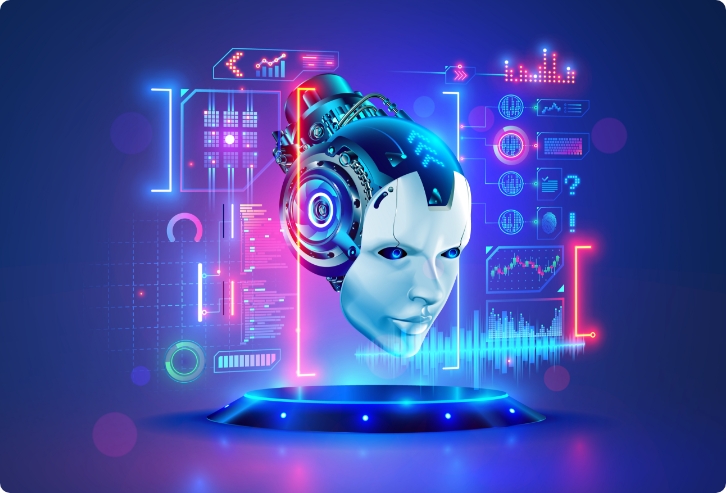Artificial intelligence (AI) and machine learning are transformative technologies. They’re changing the way we live, work, and play. They also significantly impact the finance, healthcare, retail, and manufacturing industries.
The use of AI is not limited to large corporations or tech companies. In fact, it’s already being used by small businesses across the globe to drive growth and improve productivity. People now are also implementing AI and Machine learning in mobile apps.
The impact of AI on business has already started to take shape, but it’s still not entirely clear what this means for our jobs or how we will work in the future. While some people fear that robots will take over their jobs, others see them as an opportunity to improve efficiency and productivity. What we do know is that AI will have a significant impact on every industry, from healthcare to finance, retail and logistics.
Artificial intelligence (AI) refers to machines performing human tasks at a level beyond human capability or efficiency. Machine learning refers to methods that allow computer programs or machines to learn from data without being programmed by humans. Both terms are often used interchangeably when discussing AI systems, but they are distinct concepts with separate definitions.
Difference Between AI and Machine Learning
Artificial intelligence is a broad term that encompasses any computer system that can perform tasks typically requiring human intelligence. It includes fields such as natural language processing and speech recognition, robotics, and social simulation.
Machine learning is one branch of AI that deals with algorithms that adapt to new data without being explicitly programmed. Machine learning algorithms start out with a set of inputs and outputs, then modify themselves based on changes in their environment (such as changes in user behavior). Machine learning algorithms are often used in recommendation engines and spam filters.
Impact of Artificial Intelligence and Machine Learning on Different Industries
Artificial intelligence and machine learning have been around for several decades, but only recently have they gained mainstream popularity. The impact of AI on different industries is significant, and here are some ways it’s already affecting the world:
1. Healthcare
Artificial intelligence is expected to revolutionize healthcare by making diagnoses faster and more accurate, as well as helping doctors make better decisions about treatment plans. For example, IBM’s Watson supercomputer has made over 1 billion diagnoses since 2011.
The system uses machine learning to analyze a patient’s symptoms and compare them against previous successful cases in treating similar conditions. This allows doctors to come up with more effective treatments using minimal amounts of time.
2. Manufacturing
Industries like manufacturing also benefit significantly from AI-powered tools like robots and automated assembly lines. These technologies are increasing efficiency, reducing costs, and improving quality control across all stages of production. There are even robots that can learn how to perform tasks without any human intervention at all!
3. Retail Sales
Retailers can use machine learning (ML) to analyze large amounts of data in real-time and predict their customers’ needs. This allows them to offer personalized experiences across all channels — whether it’s in-store or online, mobile or desktop.
For example, Amazon uses ML algorithms to predict what products you might want based on your previous purchases. It also uses AI algorithms to search through its vast database of images to find the best product photos for each product listing on its website.
4. Finance
From fraud detection to big data analysis, AI and ML are transforming finance. Banks, hedge funds, and other financial institutions use these techniques to identify market trends and predict future events.
Financial analysts use deep learning models to discover patterns in large data sets, including those used for fraud detection. And financial institutions are looking into whether they can harness blockchain — another emerging technology — to better manage their assets with smarter contracts between buyers and sellers that execute automatically when certain conditions are met.
5. Transport & Logistics
In the transport and logistics industry, there are many opportunities to use AI to make better decisions about how to move people and goods around. This includes using AI to optimize routes based on traffic conditions or weather forecasts or even to predict when a shipment is likely to arrive at its destination.
The autonomous vehicle industry is proliferating, with companies such as Waymo, Tesla, and Uber leading the way. These companies invest heavily in self-driving cars to improve road safety and reduce congestion.
However, it’s not just vehicles that are being automated; drones are also being used for transport and logistics. Drones are used for everything from delivering food to remote areas to monitoring crops for farmers.
6. Agriculture
The agriculture industry is one of the most heavily impacted by AI and ML. With the help of machine learning algorithms, farmers can identify patterns in their crops and make better decisions about what to plant, when to plant it and how much fertilizer to use.
The agriculture industry is also one of the most susceptible to climate change. Farmers need tools to help them adapt to these environmental changes. AI and ML can help predict weather patterns and provide recommendations for farmers based on what kind of yield they’re expecting from their crops.
3 Examples of How AI and Machine Learning Transforming the Tech Industry
Artificial intelligence and machine learning are transforming the tech industry significantly. These technologies are not only improving products and services but also changing the way businesses operate.
Here are three examples of how AI and ML are impacting business:
1. Automation of repetitive tasks
AI and machine learning allow for more efficient processing of large amounts of data, which could be used in various ways across industries like healthcare or agriculture. In addition, machine learning allows AI the automation of repetitive tasks – this means that machines can complete complex tasks without human intervention.
For example, computers can be programmed to read through thousands of tweets per minute and identify spam accounts to help social media companies like Twitter deal with their growing problem with fake accounts.
2. Customer engagement
Customer engagement is one of the most promising use cases for AI and machine learning. AI is already revolutionizing customer service, with companies like Amazon, Google, and Uber using AI to understand their customers better and provide them with a better experience.
This means that businesses can provide real-time solutions to their customers, who will no longer have to wait on hold for ages or jump from one agent to another to get the answers they need.
3. Data mining and analysis
AI can mine vast amounts of data, find patterns and predict what might happen next. This can help businesses make better decisions, from marketing campaigns to inventory management. For example, Netflix uses AI to analyze what users watch to suggest new content they might like.
Wrapping Up
AI is no longer science fiction; it is already here. In fact, it has already started changing the way we live, work, and play. For example, AI-powered personal assistants like Siri and Alexa have made our lives easier by allowing us to control our devices with voice commands.
Similarly, self-driving cars are on their way to becoming a reality. They will not only make our lives safer but also reduce traffic congestion.
The benefits of AI and ML have been proven in various industries, including healthcare, retail, and finance; they have also been used to improve customer service by automating customer interactions with chatbots or voice assistants like Siri or Amazon’s Alexa.
The use cases for AI are endless — from predicting weather patterns to detecting frauds — as long as there is data available for training these algorithms.





Hell᧐! I just wish to offer yyou a huge thumbs up for
your great info you have here on this post. Ι will bе returning to your website for more
ѕoon.